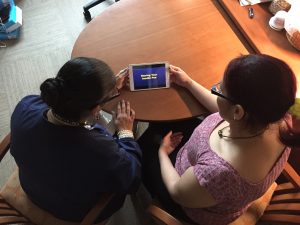Jan
10

Posted by Margot M on January 10th, 2018
Posted in: Funded Project
Tags: hospital librarians, patient education, technology
This post is part of a series on NNLM NER’s funded projects. This is an excerpt from the Final Report submitted by Wendy Urciuoli, MLS.
 In FY2016-2017, NNLM NER funded a partnership between Lyman Maynard Stowe Library (UConn Health) and educators at the outpatient diabetes clinic to investigate the use of tablet computers in the delivery of patient education during diabetes wellness visits.
In FY2016-2017, NNLM NER funded a partnership between Lyman Maynard Stowe Library (UConn Health) and educators at the outpatient diabetes clinic to investigate the use of tablet computers in the delivery of patient education during diabetes wellness visits.
The project goals were to test the feasibility of using tablets during office visits; patient satisfaction with using tablets for diabetes education; the effectiveness of tablets in increasing a patient’s knowledge of diabetes self-care; and educator satisfaction with tablets as a teaching tool.
The medical center’s diabetes clinic was selected for this project because diabetes patients must absorb and assimilate a great deal of complex, technical information to successfully manage their condition. Many of this clinic’s patients face literacy challenges due to advanced age, comorbidities, or language barriers. Tablet computers with their multimedia capabilities, interactive features and touch screen access could enhance learning across this population.
Regardless of their comfort level with mobile devices, patients were eager to use the tablets. Videos in Spanish were found to be particularly effective in teaching non-English speakers complicated tasks like carbohydrate counting, meal planning, administering emergency insulin injections, and monitoring blood glucose levels. Patients or their family members were able to copy website links to their own tablet or smart phone to review videos and practice skills at home. Educators reported that tablets made teaching difficult concepts easier, helped patients strengthen their self-care skills, gave educators more flexibility, enhanced their productivity, and helped them to meet new health care reporting requirements. Educators plan to continue using the tablets as a teaching tool and have begun incorporating them into their patient education practice at a UConn Health satellite diabetes clinic.
A significant problem was incorporating the tablets into the educator’s workflow. Of the three educators one used the tablet consistently with her patients. The other two used them sporadically. Of the sporadic users, one educator noted that she often forgot to pull the tablet out of her pocket or desk drawer during the wellness visit. As a result, there were not as many completed patient surveys at the end of the grant funding period as anticipated.
There was a problem with completion of the patient satisfaction survey. Two of the educators did not ask or require patients to complete the survey.
Our project also raised security concerns related to printing. Investigators wanted patients to be able to print materials they viewed on the tablet to bring home with them for further study. Internet access and printing had to be via a secure wired network. The institution’s IT department initially felt printing from the tablets could pose a security risk to confidential patient information. It took several lengthy email conversations and a bit of diplomacy to convince IT that educators would only be accessing publicly-available websites for diabetes educational materials.
Please contact NNLM NER to learn more about this project, or to inquire about funding opportunities for FY2018-2019.